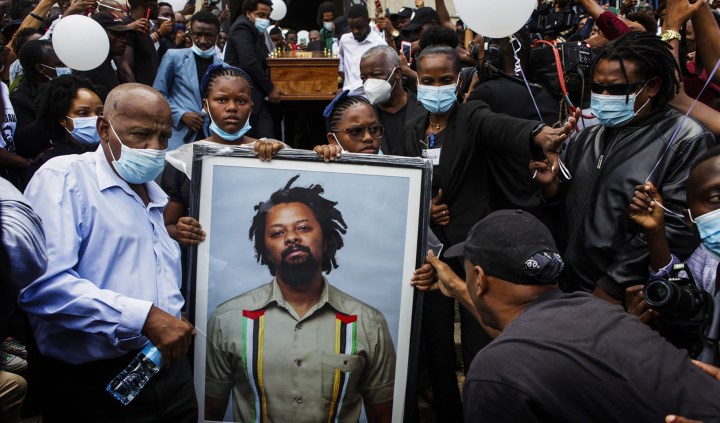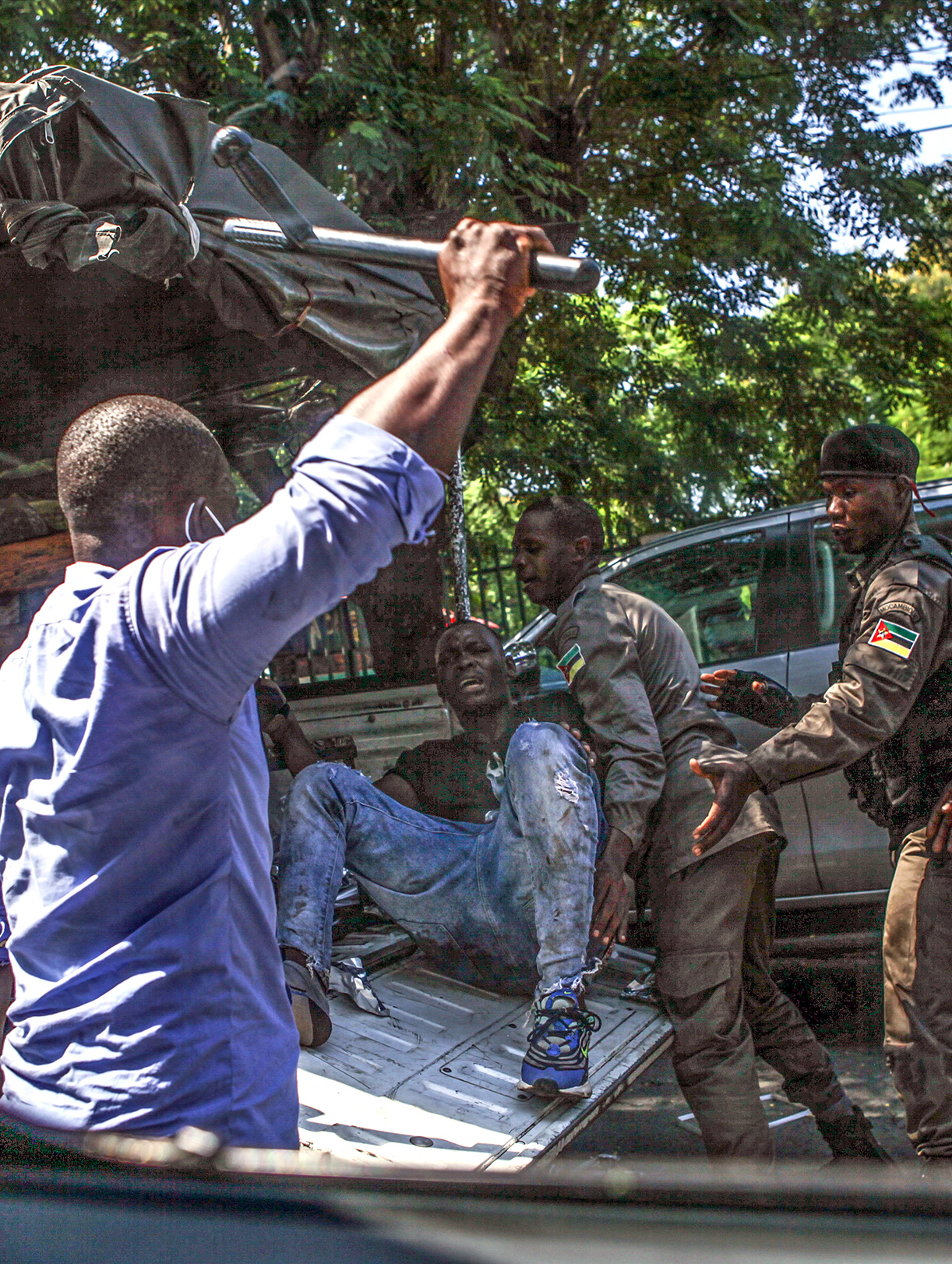ACTIVIST REPORT
Police attack mourners at funeral and memorial service of popular Mozambican rapper Azagaia

After creating havoc at the funeral procession, the Mozambican police used tear gas and rubber bullets to disband a legal memorial march to celebrate the life and legacy of the people’s rapper, Azagaia.
On Saturday, the Police of the Republic of Mozambique (PRM) violently repressed marches held across Mozambique in tribute to the musician Azagaia and fired tear gas and rubber bullets at hundreds of young people. The police injured and arrested innocent citizens who took to the streets simply to honour the “rapper of the people”.
Plans for the march had been communicated to the Maputo Municipal Council which, surprisingly, did not show any objection. In a letter sent to the organisers on Friday, March 17, the mayor of Maputo called for “the observance of all regulatory norms for the exercise of the right to demonstrate, namely about the route, the intended purposes and the limitation of time”.
That’s what young people did, or rather, wanted to do.
From 7am they began to gather at the Eduardo Mondlane statue, the starting point of the march.
But when they arrived, they were faced with a strong contingent of armed police. When the PRM was informed that the Maputo Municipal Council was aware of the march and had communicated it to the PRM and to the State Information and Security Service, the police officers said they had “superior orders” to prevent the homage to Azagaia.
Violating the Constitution
These “superior orders” flagrantly violated the Constitution of the Republic of Mozambique (CRM) and trampled on the autonomy of the Municipal Council of Maputo.
Under Article 253(1) of the CRM, the police must “guarantee law and order, safeguard the safety of people and property, public tranquillity, respect the democratic rule of law, strict observance of human rights, and fundamental freedoms of citizens.”
The Constitution requires that the police are non-partisan (article 253, paragraph 2) and, “in the exercise of their functions, must obey the law and serve citizens and public and private institutions with exemption and impartiality”.
However, on Saturday morning the action of the police went against the grain of their duties: it did not guarantee either law or order; it did not safeguard people’s safety and public tranquillity; it grossly offended the democratic rule of law and did not respect the fundamental rights and freedoms of citizens.
What’s more: by claiming that they were complying with “superior orders”, the police demonstrated that they were, in fact, complying with the political agenda of Frelimo, the ruling party.
In the name of “superior orders”, agents from the Rapid Intervention Unit (UIR) spread tear gas across avenues and streets where there were small concentrations of young people, fired rubber bullets and arrested and injured dozens of people. One young man lost an eye after being hit by a rubber bullet fired at close range by a UIR agent. A video shows another young man who was assaulted and left with a fractured left arm.
Police repression was also felt in the city of Nampula, where the mayor had spoken out in favour of honouring Azagaia. Nonetheless, the police fired tear gas at people at the starting point.
Quelimane was one of the few cities where the march took place without police impediment.

A plain clothes police officer (left) hits at a citizens with a baton after he was detained by Mozambican police in Maputo, 18 March 2023. Police forces used tear gas to disperse a crowd gathering for a march in Maputo in honour of the social intervention of the goverment critic ‘rapper’ Azagaia, who died a week ago from illness in Mozambique. (Photo: EPA-EFE / LUISA NHANTUMBO)
Visit Daily Maverick’s home page for more news, analysis and investigations
Azagaia: a voice speaking out against corruption and repression
In life, Azagaia was always critical of the bad behaviour of the police. He was a rapper who became popular through his social intervention songs. For example, in his Music of Rapid Intervention, he asked: (listen to Azagaia here):
“Imagine if a general strike was called.
Will there be so many police for so much justice?
Tear gas for so much oxygen?
Will there be so much water for so much heartache?
Until when is the dictatorship in a democratic nation?
On Tuesday, 14 March, when Azagaia’s funeral was disrupted by the PRM, his fans experienced what he was talking about.
On that day, without party mobilisation, without circulars in public institutions, without public buses, without shirts and caps, without water and soft drinks, thousands of people went to the emblematic Praça da Independência to pay their last tribute to Azagaia.
It was the greatest popular tribute in recent years.
While the funeral service was taking place inside the City Hall, thousands of young people outside recited some of his most combative lyrics.
With fists in the air, they shouted “Thieves… out; corrupt… out; assassins… out; scream at me for these people to go away”, the incisive refrain of the song A Marcha.
With its back to the crowd, the statue of Mozambique’s founding father, Samora Machel, seemed to be the only person in Praça da Independência uninterested in Azagaia’s last farewell. This was the same square where, 36 years ago, the body of Machel was laid to rest.

1976: Samora Moises Machel, before his departure from Tanzania for Mozambique, where he led Frelimo, the Mozambican Liberation Front, against the Portuguese colonial regime, becoming the country’s first president after independence. (Photo: Keystone / Getty Images)
At the time of Machel’s funeral in 1986, Edson da Luz (Azagaia’s real name) was just a two-year-old baby in the border town of Namaacha, 80km from the capital, Maputo.
Later in life, Azagaia built his career as a rapper on the opposite side of political correctness. He was a hero who was only allowed to enter the City Hall after he no longer represented any danger to politicians. In life, it was unthinkable that Eneas Comiche, the mayor of Maputo and a man averse to the most peaceful demonstrations, would authorise an Azagaia show in Praça Independência.
One of the most emotional moments was when Azagaia’s music was finally heard: almost everyone present, young and old, repeated in unison the lyrics of A Marcha, while the mourners followed the coffin.
The funeral procession ran smoothly until passing Robert Mugabe Square, where a contingent of the Rapid Intervention Unit (UIR) was positioned with armoured vehicles. Their objective was to prevent the crowd from entering the street next to the Palácio da Ponta Vermelha (the official residence of the head of state) and continuing along Julius Nyerere Avenue, where the Presidency is located.
The route planned for the funeral procession involved passing through the main centres of political power… and Azagaia’s appeal was to the “people in power”.
The government did not minimise this risk. State security mobilised agents from the UIR (which formed the first security cordon), and personnel from the Casa Militar, the force responsible for protecting the head of state, blocked the roads to the cemetery.
Azagaia’s widow, Rosa da Luz, had to leave the car to ask for passage.
“What have I done to you? What harm have I done to you? I just want to bury my husband, please. Control the population, but let them through. Why can’t we pass? Let me bury my husband with dignity,” she appealed.
The police did not leave but allowed her car to move on. The crowd had to back off and follow Avenida de Moçambique to the Michafutene cemetery, where the remains of the rapper now lie.
More than a tear-jerking moment, the tribute was a true celebration of the life of a legend… because legends never die.
Azagaia chose to speak from the people to the people and today the people are honouring his fight against police violence. His voice has disappeared, but even so, Azagaia continues to frighten the Frelimo government. DM/MC
Adriano Nuvunga and Emídio Beula are human rights defenders based in Maputo, Mozambique.




















Comments - Please login in order to comment.